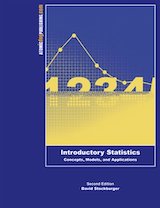
|
FreeComputerBooks.com
Links to Free Computer, Mathematics, Technical Books all over the World
|
|
- Title: Introductory Statistics: Concepts, Models, and Applications
- Author(s) David W. Stockburger
- Publisher: Atomic Dog Pub; 2nd edition; eBook (3rd Web Edition, 2016)
- Hardcover/Paperback: 275 pages
- eBook: HTML and PDF
- Language: English
- ISBN-10: 1931442029
- ISBN-13: 978-1931442022
- Share This:

|
This e-book is a complete interactive study guide with quizzing functionality that reports to the instructor. The on-line text also has animated figures and graphs that bring the print graphic to life for deeper understanding.
About the Authors- James E. Gentle is an American statistician and author. He was a professor of statistics at George Mason University until his retirement in 2016. He is Co-Editor-in-Chief of Wiley Interdisciplinary Reviews: Computational Statistics[1] and Senior Editor of Communications in Statistics.
- Statistics, Mathematical Statistics, and SAS Programming
- Probability and Stochastic Process
- Data Analysis and Data Mining
- Applied Mathematics

- Introductory Statistics: Concepts, Models, and Applications (David W. Stockburger)
- The Mirror Site (1) - PDF
-
 Introductory Statistics (OpenStax College)
Introductory Statistics (OpenStax College)
This book is geared toward students majoring in fields other than math or engineering. This text assumes students have been exposed to intermediate algebra, and it focuses on the applications of statistical knowledge rather than the theory behind it.
-
 Introductory Statistics (T. H. Wonnacott, et al)
Introductory Statistics (T. H. Wonnacott, et al)
This book is an introduction to statistics for students of economics or business, suitable for a one or two-semester course, yet uses the simplest mathematics consistent with a sound presentation.
-
 Mostly Harmless Statistics (Rachel L. Webb)
Mostly Harmless Statistics (Rachel L. Webb)
This text is for an introductory level probability and statistics course with an intermediate algebra prerequisite. The focus of the text follows the American Statistical Association's Guidelines for Assessment and Instruction in Statistics Education (GAISE).
-
 Introduction to Modern Statistics (Mine Çetinkaya-Rundel, et al.)
Introduction to Modern Statistics (Mine Çetinkaya-Rundel, et al.)
This book puts a heavy emphasis on exploratory data analysis and provides a thorough discussion of simulation-based inference using randomization and bootstrapping, followed by a presentation of the related Central Limit Theorem based approaches.
-
 Foundations in Statistical Reasoning (Pete Kaslik)
Foundations in Statistical Reasoning (Pete Kaslik)
This book is designed for students taking an introductory statistics class. The emphasis throughout the entire book is on how to make decisions with only partial evidence. It focuses on the thought process.
-
 O'Reilly® Think Bayes: Bayesian Statistics in Python
O'Reilly® Think Bayes: Bayesian Statistics in Python
If you know how to program, you're ready to tackle Bayesian statistics. With this book, you'll learn how to solve statistical problems with Python code instead of mathematical formulas, using discrete probability distributions rather than continuous mathematics.
-
 Statistical Inference: Algorithms, Evidence, and Data Science
Statistical Inference: Algorithms, Evidence, and Data Science
A masterful guide to how the inferential bases of classical statistics can provide a principled disciplinary frame for the data science of the twenty-first century. Every aspiring data scientist should carefully study this book, use it as a reference.
-
 Forecasting: Principles and Practice (Rob J. Hyndman, et al.)
Forecasting: Principles and Practice (Rob J. Hyndman, et al.)
This textbook provides a comprehensive introduction to forecasting methods and presents enough information about each method for readers to use them sensibly. Examples use R with many data sets taken from the authors' own consulting experience.
-
 Foundations of Descriptive and Inferential Statistics (H. van Elst)
Foundations of Descriptive and Inferential Statistics (H. van Elst)
This book aim to provide an accessible though technically solid introduction to the logic of systematical analyses of statistical data to both undergraduate and postgraduate students, in particular in the Social Sciences, Economics, and the Financial Services.
-
 Statistics Done Wrong: The Woefully Complete Guide (Reinhart)
Statistics Done Wrong: The Woefully Complete Guide (Reinhart)
Scientific progress depends on good research, and good research needs good statistics. But statistical analysis is tricky to get right, even for the best and brightest of us. You'd be surprised how many scientists are doing it wrong.
-
 Lies, Damned Lies: How to Tell the Truth with Statistics
Lies, Damned Lies: How to Tell the Truth with Statistics
The goal is to help you learn How to Tell the Truth with Statistics and, therefore, how to tell when others are telling the truth ... or are faking their "news". Covers Data Analysis, Binomial and normal models, Sample statistics, confidence intervals, hypothesis tests, etc.





